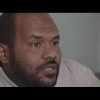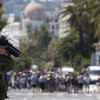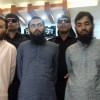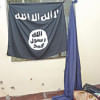Some unresolved issues
Of late, terrorists or unknown assailants have killed freethinking writers and bloggers, a couple of foreign nationals, and two LGBT activists in Bangladesh, around 36 people since February 2015. And almost ritualistically, killers have been bragging about their acts, and proclaiming to be al Qaeda, ISIS, Ansar al-Islam, or Ansarullah Bangla Team affiliates. Interestingly, some Bangladeshi politicians claim: (a) various Islamist terrorists groups – including al Qaeda and ISIS – have infested the country; (b) they are linked with the two main opposition parties in the country, the BNP and Jamaat-e-Islami; and (c) they have resorted to terrorism only to overthrow the present government.
We know there's nothing new about terrorism in Bangladesh. Non-state actors like Maoist Naxalites, JMB, and HUJI (B), and state-sponsored death-squads –the Rakkhi Bahini, police, and RAB – by now have allegedly killed thousands of people in the country. The JMB-HUJI (B) alone killed more than 150 people during 1999 and 2005, in movie theatres, political rallies, and elsewhere. Since early 2013, no place seems to be out of bounds for the killers, who purportedly belong to some Islamist terror outfits. But who actually have been killing so many innocent people here, we simply don't know.
However, since law-enforcers so far have managed to arrest only a handful of suspects, including one Jamaat-e-Islami activist in connection with the killing of Professor Rezaul Karim Siddique of Rajshahi University last month, it seems that either the "terrorists" have some sort of impunity, or even worse, they simply vanish into thin air! The worst assumption could be some unknown killing squads doing the dirty job on behalf of the actual beneficiaries of these indiscriminate or selective killings. We know that the first three things the police and detectives do to resolve a murder mystery are to find out: a) the killer (s); b) the motive of the killing; and c) the actual beneficiary (ies) of the crime. And only a Sherlock Holmes could lead us to the killers, their motives, and the beneficiaries of the mindless killings.
It's simply unbelievable that while al Qaeda, ISIS, or their local affiliates, or some indigenous groups have purportedly been killing people right and left – not with bombs or guns, mostly with machetes inside the victims' residences, workplaces, or in public thoroughfares, often in broad daylight – the police and intelligence departments have suddenly become too "inefficient and clueless" to apprehend the killers. Strangely, the police didn't even bother to interview the slain freethinking blogger/writer Avijit Roy's wife – killers of her husband gravely injured her too – who is an eyewitness to the killing. Interestingly, the same police and intelligence departments in the past tracked down and captured most masterminds of the JMB and HUJI (B) terror groups, including the Bangla Bhai, Shaykh Abdur Rahman, and Mufti Abdul Hannan in 2005-06, while the BNP-Jamaat coalition was in power.
What Avijit's father Professor Ajoy Roy said publicly last week is very revealing and also disturbing: "I have been silenced. The police initially told me the three killers of my son had been under their surveillance. On my asking why they were not arresting them instead, they had no answer. Now the police are saying that the killers have already left the country". My former Dhaka University colleague and friend Professor A.K. Fazlul Haque – who also recently lost his son to unknown assailants – believes that killers enjoy some sort of impunity. The experiences of the bereaved parents, and our own experiences, and common sense collectively demolish the hunch and conspiracy theories about al Qaeda, ISIS, or the ubiquitous BNP-Jamaat involvements in the ongoing killings of freethinkers, foreign nationals, LGBT activists, and others in Bangladesh.
Now, not only the ruling coalition and its main Opposition (which is outside the Parliament) contradict each other as to who have been killing writers, bloggers and freethinkers in the country, but some ministers of the coalition government also contradict each other in this regard. While the Home Minister Asaduzzaman Khan denies the existence of ISIS in Bangladesh, Information Minister Hasanul Haq Inu insists that there are 8,000 al-Qaeda supporters in the country. And we know that ISIS is an offshoot of al Qaeda.
Politicians here – like elsewhere in the world – often delude people with cry wolves, blame games, and false flag operations. Raising the spectre of al Qaeda or the Islamist bogey has been a favourite political game in Bangladesh since the 1990s. Interestingly, we hear that the BNP-Jamaat alliance is in league with al Qaeda and its ilk all the time.
It's sad but true that some Western governments, media, and think tanks have been projecting Bangladesh as a safe haven for Islamist terrorism since the late 1990s. As the New York Times reported on March 20, 2000, President Clinton cancelled his planned road trip to Joypura – a village 20 miles northwest of Dhaka – (while he was visiting Bangladesh) because of "concerns raised by the Secret Service". Interestingly, the same report added: "Bangladesh does not have a recent history of violent incidents".
Soon after 9/11, the Wall Street Journal, its Asian subsidiary, the Far Eastern Economic Review, and the Christian Science Monitor started publishing half-baked, sensational articles on Bangladesh by Eliza Griswold, Bertil Lintner, Selig Harrison and others, portraying the country as one on the verge of an Islamist takeover. Lintner portrayed the military in Bangladesh "with ties to the militants", allegedly being churned out by local madrasas. We find the reflection of such sensationalism in some Bangladeshi politicians' statements, newspaper reporting, and even some "academic research" which portray "Middle East-sponsored" Islamic banking, insurance, madrasas, and the Jamaat-e-Islami as promoters of violent Islamism in Bangladesh.
The latest killings in Bangladesh have saddened and outraged the whole world. The UN Secretary General, Secretary John Kerry and Assistant Secretary Nisha Desai Biswal of the U.S. State Department, among others, recently asked the Bangladesh government to take immediate action against the killers. Thanks to the Government's failure to produce credible proof about who the killers of freethinkers in Bangladesh are, most people at home and abroad want convincing answers about the killers' identities, and the motives of the killings. Meanwhile, both Washington and Delhi want to work together with Dhaka to tackle the problem of Islamist extremism in Bangladesh.
While Washington and Delhi seem to have drawn the conclusion that Islamist terrorists have been doing these killings, Dhaka seems to be somewhat ambivalent in this regard. The Bangladesh Government on the one hand denies there is any al Qaeda or ISIS in the country, on the other it holds BNP-Jamaat supporters – the so-called anti-Liberation and pro-Islamist terrorists – responsible for the killings. Thus, it's difficult to agree with Marcia Bernicat, the US Ambassador to Bangladesh, that Bangladesh, India and the United States – all fighting extremism – are all on the same page with regard to the killings in Bangladesh.
The writer teaches security studies at Austin Peay State University. He is the author of several books, including his latest, Global Jihad and America: The Hundred-Year War Beyond Iraq and Afghanistan (Sage, 2014).
Email: [email protected]

 For all latest news, follow The Daily Star's Google News channel.
For all latest news, follow The Daily Star's Google News channel. 








Comments